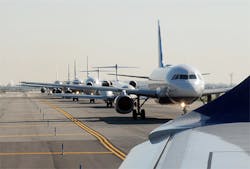WASHINGTON – U.S. Department of Transportation Secretary Anthony Foxx announced today that in calendar year 2014, airlines reported the lowest number of tarmac delays longer than three hours on record. According to the U.S. Department of Transportation’s Air Travel Consumer Report, in 2014 there were 30 domestic flights with tarmac delays longer than three hours and nine international flights with tarmac delays longer than four hours at U.S. airports. There were no long domestic or international tarmac delays in December 2014.
In 2009, the last full year before the Department’s domestic tarmac rule went into effect, airlines reported 868 domestic flights with tarmac delays longer than three hours. There were 84 domestic flights with tarmac delays longer than three hours and 55 international flights with tarmac delays longer than four hours at U.S. airports in 2013.
“These tarmac delay rules are meant to protect passengers and it appears that the airlines have gotten the message,” said Secretary Foxx. “We have aggressively enforced, and will continue to aggressively enforce, our tarmac delay rules to ensure that carriers have adequate resources, such as staff and equipment, to minimize passengers’ exposure to lengthy tarmac delays, and that passengers are treated with respect before, during, and after their flights.”
The Department’s rule prohibiting U.S. carriers operating domestic flights from allowing tarmac delays longer than three hours without giving passengers an opportunity to deplane went into effect in April 2010. A separate rule prohibiting U.S. and foreign carriers operating international flights to or from the U.S. from allowing tarmac delays longer than four hours at U.S. airports without giving passengers an opportunity to deplane took effect in August 2011. Exceptions to the time limits for both domestic and international flights are allowed only for safety, security, or air traffic control-related reasons.
In addition, the nation’s largest airlines canceled 1.4 percent of their scheduled domestic flights in December, half of the 2.9 percent cancellation rate posted in December 2013, but up from the 0.9 percent rate in November 2014.
The consumer report also includes data on on-time performance, chronically delayed flights, and the causes of flight delays filed with the Department’s Bureau of Transportation Statistics (BTS) by the reporting carriers. In addition, the consumer report contains information on passengers denied confirmed space (oversales/bumping) as filed with BTS by the carriers, statistics on mishandled baggage, as well as consumer service, disability, and discrimination complaints received by DOT’s Aviation Consumer Protection Division. The Department routinely contacts individual carriers when it notices spikes or significant variations in complaint types or complaint levels in regulated areas. The consumer report also includes reports of incidents involving the loss, death, or injury of pets traveling by air, as required to be filed by U.S. carriers.





